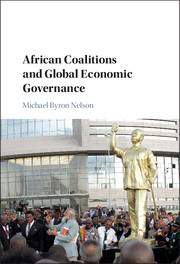1 - Introduction
Published online by Cambridge University Press: 05 September 2016
Summary
The familiar litany of Africa's marginality to world politics and global markets makes it almost ridiculous to speak of African influence or power. But that is the wrong view to take. In 2003, four of the poorest countries in the world asked the most powerful countries in the world to change their support for domestic cotton producers. That year, Benin, Burkina Faso, Chad, and Mali ranked 159, 173, 165, and 172 of the 177 nations listed on the UN Human Development Index. They are not even powerful states in their own subregion, yet their requests placed cotton at the center of the Doha Round of international trade negotiations. The so-called Cotton 4's initiative became an important part of the agenda for the World Trade Organization's (WTO) Cancún ministerial meeting that September. And for the first time, the WTO created a sector-specific committee. Within two years, the European Union and the United States agreed to important concessions. The ultimate outcome of these efforts is still uncertain, but it is clear that African actions had consequences.
Two things are important to note about this story. First, African states did not act individually but as part of a coalition. They recognized that working together increased their chance of success. The second thing to note is that their activities focused on a single international organization, the WTO. As this book discusses, there are many areas of global governance where it may be necessary to focus on more than one international organization. That has important implications for coalitions.
Using coalitions – groups of states that number from two to well over 100 – African states and other developing countries have consistently worked to transform global governance. My puzzle is why are coalitions more prevalent and active in the governance of some issue areas and not others? In the cotton case just mentioned, four resource-poor states organized themselves and effectively acted to protect interests worth an estimated $300 million per year. Yet, at other times, such collective action often fails to materialize. When the European Union announced new food safety measures regulating peanuts, measures widely expected to cost African states as much as $670 million in lost revenues per year, no coalition formed.
- Type
- Chapter
- Information
- African Coalitions and Global Economic Governance , pp. 1 - 16Publisher: Cambridge University PressPrint publication year: 2016



